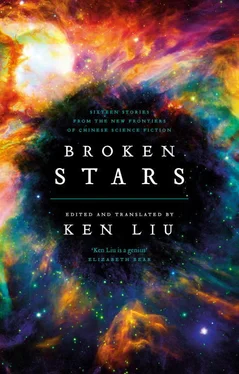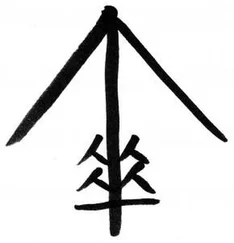In actuality, in the Thousand Character Classic , one of the characters—the one for “pure”—did occur twice. The East City Institute removed one of them and substituted a piece of type with a bent arrow symbol. Since it would have been too difficult for two users to simultaneously type and squint at the text tray for a reply, Prince Lu decreed that the current speaker had to press this “carriage return” block when they finished typing to indicate that it was the other person’s turn. Why the symbol was called “carriage return” was something Prince Lu never bothered to explain.
At first, only two people could talk on a web connection at once, but Prince Lu later invented a complicated bronze hook rack that linked many internet lines together at once. If one person pressed a character, it would show up on all the other text trays.
This advance in the internet led to a new problem. If eight scholars sat down to chat, the moment one of them pressed the return key, the other seven would fight to speak first, with the result that their text trays would undulate up and down uncontrollably, like the dark waters of Lake Jinyang rippling in the north wind. To solve this problem, the East City Institute sold a new kind of text tray with ten blank type squares. When web users took advantage of the bronze rack to form a chat group, everyone first carved the members’ appellations onto the squares. If someone wanted to speak, they pressed the block with their name. Whoever’s block moved first had the right to speak until they pressed carriage return. Prince Lu first called this arrangement a “three-way handshake,” then “vying for the mic,” although he never explained what these terms meant. Zhu Dagun loved to smash his own “Zhu” block nonstop, naturally earning severe rebuke within his circles. Block-mashing not only disrupted the others’ ability to speak, but also often caused the internet line to snap.
Though the silk threads were resilient, damage from wind, rain, insects, mice, and bad users like Zhu Dagun was inevitable, and the lines broke from time to time. If you were chatting, only for someone to suddenly call you an “ignorant dog unworthy of the title of scholar sullying the names of past sages,” it was a good sign that the threads for some of your type blocks had broken. While you had meant to type “The Master spake, ‘even the sage-kings of old were met with failures in this,’” what had shown up in the other text trays was “The Master spake, ‘the sage-kings of old were failures,’” thereby not only denouncing the legendary sage-kings, but also smearing great Confucius as well.
At times like this, you had to yell “Manager!” and give the network manager a few coins for the trouble of inspecting the web lines while you took the opportunity to go to the market and buy a few pounds of flatbread. Meanwhile, the manager would sever the connection, find the broken silk lines, and knot them back together. If you didn’t invest enough into a friendly relationship with the network manager, he’d tie a big fat knot that clogged the network so that your lines moved at the rate of a geriatric ox pulling a caravan. But if you did hand over enough coppers, he’d take out a little comb, smooth out the threads until they gleamed, and tie a minuscule square knot. Then you tossed the flatbread through the station window and yelled “All’s well!”—that was why Zhu Dagun had no choice but to reserve money for bribing the network manager, no matter how strained his wallet.
The East City Institute’s siege defense weaponry won it the hearts of the soldiers; its peculiar little inventions won the hearts of the commoners; and the internet won the hearts of the scholars. To moralize and debate and weigh in on anything one desired without having to step outside one’s door—such convenience had never been available to anyone, not even in the time of the ancient sages of legend. With the Song army surrounding the city, the scholars could no longer venture out of the city to climb Xuanwa Mountain, sightsee along the Fen River, or drink and admire the flowers. Being shut inside, they had only writing to serve as a pastime, and that dejected them further. If it weren’t for West City’s internet coverage, these destitute, bored intellectuals would have tried to overthrow the government long ago. With an entire state reduced to one city, its three ministries and six departments gone in all but name, no pay for the ministers, and the emperor not even attending court, the scholars had become the most idle and useless group in the city and could only snipe and complain online.
If some loved the internet, of course others kept their distance, as they would for ghosts and gods—and anything else they didn’t really understand. If some praised Prince Lu, of course others muttered behind his back. No one had actually seen his person, but he was the hottest topic of gossip among the wards.
Zhu Dagun had never dreamed that the first time he had any contact with the prince would involve being sent by Ma Feng and Guo Wanchao to advise surrender. Whether it was more moral to fight or surrender, he hadn’t quite figured out himself. But since both the civil minister and the general charged him with such a weighty task, he could only venture forth, a petition and a sharp knife hidden in his clothes.
5.
The oxcart proceeded creakily past the walled courtyard of an inn. Prince Lu had built it not long after he came to Jinyang. The inn was painted orange, with a blue plaque emblazoned in large characters, BEST WESTERN, presumably to advertise itself as the best inn in West City. It was a somewhat odd name, though rather tame by the standards of the other neologisms that Prince Lu had invented.
After Prince Lu moved to the East City Institute, he had two windows carved in the wall surrounding the courtyard, one for selling wine and another for selling miscellaneous gadgets. The prince’s wine was called weishiji , presumably a poetic contraction for the phrase “feared and respected by even mighty warriors.” It was brewed by soaking and boiling the grain brought from Liao, creating an alcoholic liquid clear as water and crisp as ice that burned a trail of fire through one’s guts upon imbibing, far superior in flavor to the rice wine sold in the market. Two pints cost three hundred coins, a high price in a time of abundant moonshine stills, but connoisseurs naturally had their ways of paying.
“Soldiers, give us a volley!”
Zhu Dagun turned and saw a dozen or so hooligans standing at the foot of the city wall, yelling toward the outside. A soldier’s head poked out from the parapets above. “Are you short on cash again, Zhao Second? You’d better give us a bigger share of that good wine this time, or else the general’s going to crack down and—”
“Of course, of course!” the hooligans laughed. Then they resumed yelling in unison, “Soldiers, give us a volley! Soldiers, give us a volley!”
Soon after came the voices of the Song soldiers, yelling from outside the city. “You’d better keep your word! Five hundred arrows for twenty pints! Don’t you dare shortchange us.”
“Of course, of course!” With that, the hooligans jumped to action, wheeling out seven or eight haycarts from heaven knew where and arranging them at a distance from the wall. Then they ducked down at the foot of the wall, covering their heads with their arms. “All set. Shoot!”
Bows twanged. A swarm of arrows dense as locusts hissed through the air, arced over the ramparts, and thunked into the piles of hay, instantly transforming the carts into oversized hedgehogs.
Zhu Dagun watched from a distance, fascinated. “I’ve heard the old story of the Three Kingdoms strategist who propped up straw men to trick arrows from the enemy. I never thought it would still work.”
Читать дальше












